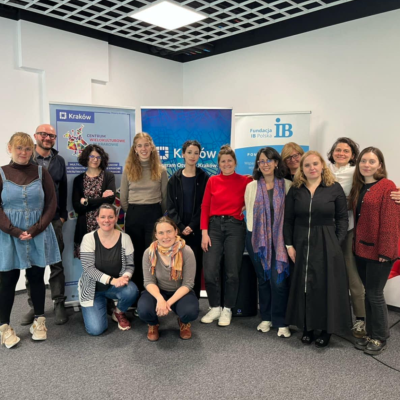Details
Article
We’ve just concluded the third workshop of the FeMig.Lab project, held from 14–16 May 2025, and co-organized by Humanity in Action Poland in cooperation with Minor, Ethnographic Museum of Istria, LVR Industrial Museums, and Centrum voor de Geschiedenis van Migranten.
This edition took place at the Centrum Wielokulturowe w Krakowie, where participants engaged in exploring the theme of “Cities as Spaces of Solidarity” and examined various participatory remembrance practices.
Drawing on both local experiences and international perspectives, the workshop provided a rich environment for reflection, exchange, and collaborative inquiry.
Key Highlights
Urban Inclusion through Historical Reflection
The workshop explored how urban spaces – particularly Kraków – continue to respond to contemporary migration challenges through inclusive practices rooted in complex historical legacies of displacement and resilience.
Contributions from Prof. Agnieszka Trąbka (Institute of Applied Psychology, Jagiellonian University), Alena Belausava and the team from KROK Association, and Alicja Zioło provided valuable insights into the intersection of gender, migration, and memory work.
Reinterpreting Biographies through the 10 STAGES App
Larysa Michalska, Project Manager at Humanity in Action Polska, presented the biography of Krystyna Modrzewska, one of the figures featured in the 10 STAGES educational app. This narrative served as a case study for exploring new approaches to history education and memory transmission through feminist and migration lenses.
Sharing Inclusive Practices from Kraków and Warsaw
Contributions by Małgorzata Kołaczek (Fundacja W Stronę Dialogu) and Paulina Pilipiuk (Centrum Wielokulturowe w Krakowie / Fundacja IB Polska) outlined practical examples of inclusive support systems in both Kraków and Warsaw, highlighting community-based approaches to migrant and minority inclusion.
Innovative Methodologies in Biographical Research
Gabriela Nicolescu introduced her “method of easiness” – a creative approach that incorporates photo archives and personal objects into biographical interviews.
The workshop also marked an important step toward the development of the FeMig.Lab digital platform – a space designed to share tools, resources, and collaborative research at the intersection of gender, labor, and migration. Further updates will be shared soon.
This project is supported by the European Union through the Citizens, Equality, Rights and Values Programme (CERV).

